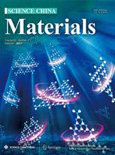
Science China-Materials
Scope & Guideline
Connecting Global Minds in Materials Science.
Introduction
Aims and Scopes
- Advanced Energy Materials:
Research on materials that enhance energy storage, conversion, and efficiency, including lithium-ion batteries, sodium-ion batteries, and other electrochemical systems. - Nanomaterials and Nanotechnology:
Focusing on the synthesis, characterization, and application of nanomaterials, particularly in catalysis, electronics, and biomedical fields. - Photonic and Optoelectronic Materials:
Studies on materials used for light-emitting devices, solar cells, and photodetectors, emphasizing efficiency and stability improvements. - Biomaterials and Bioinspired Materials:
Research that explores the design and application of materials inspired by biological systems for medical and environmental applications. - Functional Materials for Electronics:
Development of materials for electronic applications, including semiconductors, memristors, and flexible electronics. - Environmental and Sustainable Materials:
Research on materials aimed at addressing environmental challenges, such as CO2 reduction, water purification, and sustainable energy solutions. - Machine Learning in Materials Science:
Utilizing machine learning techniques to predict material properties, optimize synthesis processes, and accelerate materials discovery.
Trending and Emerging
- Solid-State Batteries:
Growing interest in solid-state battery technologies, which promise higher safety and energy densities compared to conventional liquid electrolyte systems. - Sustainable and Green Materials:
Increased focus on developing sustainable materials for energy storage, catalysis, and environmental remediation, reflecting global sustainability efforts. - 2D Materials and Heterostructures:
Emerging research on two-dimensional materials and their heterostructures for applications in electronics, photonics, and energy storage. - Artificial Intelligence and Machine Learning:
Integration of AI and machine learning in materials design and discovery processes, enabling faster identification of promising materials. - Biomedical Applications of Materials:
Increasing exploration of materials for biomedical applications, including drug delivery, tissue engineering, and biosensors. - Advanced Photocatalysts for CO2 Reduction:
Research trends indicate a growing interest in developing efficient photocatalysts for CO2 reduction, aligning with climate change mitigation efforts. - Nanomaterials for Energy Conversion:
Emerging focus on nanomaterials for energy conversion applications, including photocatalysis, electrocatalysis, and thermoelectrics.
Declining or Waning
- Traditional Metal Alloys:
Research on traditional metal alloys has seen a decrease as newer materials like high-entropy alloys and nanomaterials gain prominence. - Bulk Materials without Functionalization:
Studies focusing solely on bulk materials without functionalization or composite approaches are becoming less common in favor of more complex structures. - Low-Efficiency Photovoltaic Materials:
There is a noticeable decline in research centered around low-efficiency photovoltaic materials, as the focus shifts towards high-efficiency perovskite and organic solar cells. - Conventional Battery Technologies:
Research on conventional battery technologies without innovative enhancements is waning, as there is a greater emphasis on next-generation batteries and solid-state systems. - Static Materials Characterization:
The trend is moving away from static characterization methods in favor of dynamic and in-situ analysis techniques that provide real-time insights into material behavior.
Similar Journals

Frontiers of Materials Science
Bridging Academia and Industry through Materials InnovationFrontiers of Materials Science is a groundbreaking journal dedicated to exploring advanced materials and their applications within the ever-evolving landscape of materials science. Published by HIGHER EDUCATION PRESS, this journal offers a crucial platform for scholars and practitioners seeking to disseminate innovative research findings that foster interdisciplinary collaboration. Since its inception in 2011, the journal has enjoyed a notable Q2 ranking in the category of Materials Science (miscellaneous) as of 2023, positioning it among the noteworthy publications in the field with a Scopus rank of #222 out of 463. While predominantly published in China, the journal is committed to open access principles, allowing global accessibility to cutting-edge research. With its comprehensive coverage spanning materials synthesis, characterization, properties, and applications, Frontiers of Materials Science not only serves as a repository for academia but also bridges the gap between research and industry, making it an indispensable resource for researchers, professionals, and students alike.

Functional Materials
Pioneering Discoveries for Technological Progress.Functional Materials is a pioneering journal dedicated to the exploration and application of innovative materials science. Published by the NATL ACAD SCIENCES UKRAINE, INST SINGLE CRYSTALS, this journal provides a platform for researchers, professionals, and students to disseminate their findings in the realm of functional materials, which play a crucial role in various technological advancements. With an ISSN of 1027-5495 and E-ISSN 2218-2993, Functional Materials features research articles that span the spectrum of material properties and behaviors, contributing to both theoretical and applied sciences. Despite its current categorization in the Q4 quartile of Materials Science (miscellaneous) as of 2023, the journal aspires to foster impactful research, encouraging submissions that push the boundaries of knowledge and innovation in the field. Located in Kharkiv, Ukraine, the journal is an integral resource for anyone involved in materials science, providing insights that drive future discoveries and applications.

Carbon Energy
Transforming energy research into impactful solutions.Welcome to Carbon Energy, an esteemed open-access journal published by WILEY that focuses on cutting-edge research in the field of energy and materials science. Since its inception in 2019, this journal has quickly established itself as a leading platform for disseminating impactful findings and innovations related to carbon-based energy solutions, renewable resources, and sustainability practices. With its impressive Q1 rankings in multiple categories—including Energy (miscellaneous), Materials Chemistry, and Renewable Energy—Carbon Energy is recognized for delivering high-quality, peer-reviewed content that meets the rigorous standards of the academic community. Through its open-access model, the journal ensures wide accessibility of research findings, making it an invaluable resource for researchers, professionals, and students alike. As we look toward the future, Carbon Energy aims to further its mission of advancing sustainable energy technologies and promoting interdisciplinary collaboration in tackling global energy challenges.
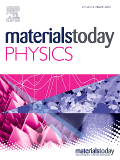
Materials Today Physics
Driving Progress in Interdisciplinary Materials ResearchMaterials Today Physics, published by Elsevier, is a prestigious journal that focuses on the interdisciplinary field of materials science, physics, and energy innovations. With an impressive impact factor and a Q1 ranking in three categories—Energy (miscellaneous), Materials Science (miscellaneous), and Physics and Astronomy (miscellaneous)—it stands out as a key platform for disseminating high-quality research. The journal, which has been in circulation since 2017, provides a vital resource for academics and industry professionals alike, facilitating the exchange of knowledge and driving advancements in materials research. Available in both traditional and open-access formats, Materials Today Physics aims to publish cutting-edge research articles that push the boundaries of material properties and their applications, thereby contributing to the development of sustainable technologies and energy solutions. With a commitment to excellence, this journal offers a robust avenue for researchers to share their findings with a global audience, making it an essential tool for those engaged in the rapidly evolving fields of physics and materials science.
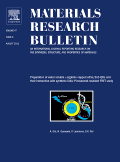
MATERIALS RESEARCH BULLETIN
Elevating research standards in materials science.MATERIALS RESEARCH BULLETIN is a prestigious journal published by Pergamon-Elsevier Science Ltd, dedicated to advancing the field of materials science and engineering. Since its inception in 1966, the journal has served as a platform for high-impact research, particularly in areas such as condensed matter physics, mechanical engineering, and materials mechanics. With an impressive Q1 ranking in multiple categories, including Condensed Matter Physics and Materials Science, MATERIALS RESEARCH BULLETIN stands out as a leading resource in its domain, aiming to disseminate innovative research findings and methodologies that address fundamental and applied aspects of materials. The journal’s rigorous peer-review process ensures the publication of high-quality articles, making it an essential resource for researchers, professionals, and students alike. With its ongoing commitment to fostering scientific discourse and collaboration, MATERIALS RESEARCH BULLETIN remains at the forefront of materials research, contributing significantly to the global scientific community.
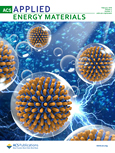
ACS Applied Energy Materials
Unleashing Potential in Energy TechnologiesACS Applied Energy Materials, published by the American Chemical Society, is a premier journal dedicated to the cutting-edge fields of energy materials, chemical engineering, and electrochemistry. With an impressive impact factor and consistently ranked in the Q1 category across multiple disciplines—including Chemical Engineering, Electrical and Electronic Engineering, and Materials Chemistry—this journal serves as a pivotal platform for researchers and professionals focused on innovative solutions for energy systems and materials science. Since its inception in 2018, ACS Applied Energy Materials has been committed to disseminating high-quality research that addresses pressing energy challenges, promoting sustainability and efficiency in various applications. Its competitive Scopus rankings reflect the journal's influence and relevance within the academic community, making it an essential resource for anyone looking to stay at the forefront of energy materials research.

Carbon Letters
Exploring the Future of Carbon Science.Carbon Letters, published by SPRINGER JAPAN KK, is a premier academic journal based in Singapore that focuses on groundbreaking research in the fields of Ceramics and Composites, Energy Engineering, Inorganic Chemistry, Materials Chemistry, and Organic Chemistry. With an exceptional reputation reflected in its 2023 category quartiles, which include Q1 rankings across multiple disciplines, this journal serves as a vital resource for researchers and professionals seeking to stay at the forefront of carbon-related studies and applications. Although it is not an open access publication, Carbon Letters facilitates the dissemination of high-quality research addressing contemporary challenges in renewable energy, sustainability, and environmental engineering, supporting the academic community's efforts in advancing science and technology. The journal has a robust converged period from 2014 to 2024, signaling its ongoing commitment to excellence in academia.
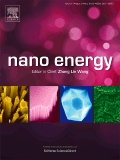
Nano Energy
Innovating Tomorrow's Energy SolutionsNano Energy is a premier journal published by Elsevier, focused on the dynamic intersection of nano-technology and energy solutions. Since its inception in 2012, this high-impact journal has made significant strides in advancing research across multiple disciplines, showcasing groundbreaking studies in Electrical and Electronic Engineering, Materials Science, and Renewable Energy. With an impressive Impact Factor that places it in the Q1 category of these fields—including a distinguished rank of #6 in Electrical Engineering and #9 in Renewable Energy on Scopus—the journal serves as a vital resource for academics and practitioners alike. Nano Energy aims to disseminate innovative research and developments that contribute to the sustainable energy landscape, thereby addressing pressing global energy challenges. Researchers and professionals seeking to stay at the forefront of nanotechnology applications in energy generation and efficiency will find this journal an indispensable platform for sharing knowledge and driving impact.

eScience
Advancing Sustainable Solutions Through Innovative ResearcheScience, published by KEAI PUBLISHING LTD, is an innovative open-access journal that has rapidly established itself as a leading platform in the fields of Electrochemistry, Materials Chemistry, and Renewable Energy, Sustainability, and the Environment. Since its inception in 2021, eScience has garnered recognition for its high-quality research, achieving an impressive Q1 ranking in each of its primary categories as of 2023. With a remarkable Scopus ranking—placing it among the top percentile of journals in these disciplines—eScience serves as an essential resource for researchers and practitioners aiming to advance knowledge and application in sustainable practices and materials innovation. As an open-access journal, eScience supports widespread dissemination of vital research, ensuring accessibility for all, which is critical in addressing contemporary global challenges. The journal's commitment to fostering interdisciplinary dialogue and collaboration positions it as a cornerstone for those dedicated to pushing the boundaries of scientific discovery.
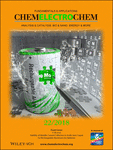
ChemElectroChem
Unlocking innovative solutions for a sustainable future.ChemElectroChem is a premier open-access journal published by WILEY-V C H VERLAG GMBH, focusing on the interdisciplinary fields of catalysis and electrochemistry. Established in 2014 and actively publishing until 2024, this journal boasts an impressive reputation, currently ranked in the Q2 category for both catalysis and electrochemistry according to the 2023 metrics. With an Scopus ranking placing it in the 74th percentile for Electrochemistry and 61st for Chemical Engineering and Catalysis, ChemElectroChem serves as an essential platform for researchers, professionals, and students dedicated to advancing knowledge and fostering innovation in these critical scientific domains. Since its transition to open access in 2023, the journal aims to maximize the dissemination of cutting-edge research and facilitate the exchange of ideas among global scholars, thereby enhancing the accessibility and impact of high-quality science within the community. For those engaged in the ever-evolving conversations around energy storage, conversion processes, and sustainable solutions, ChemElectroChem is an invaluable resource.